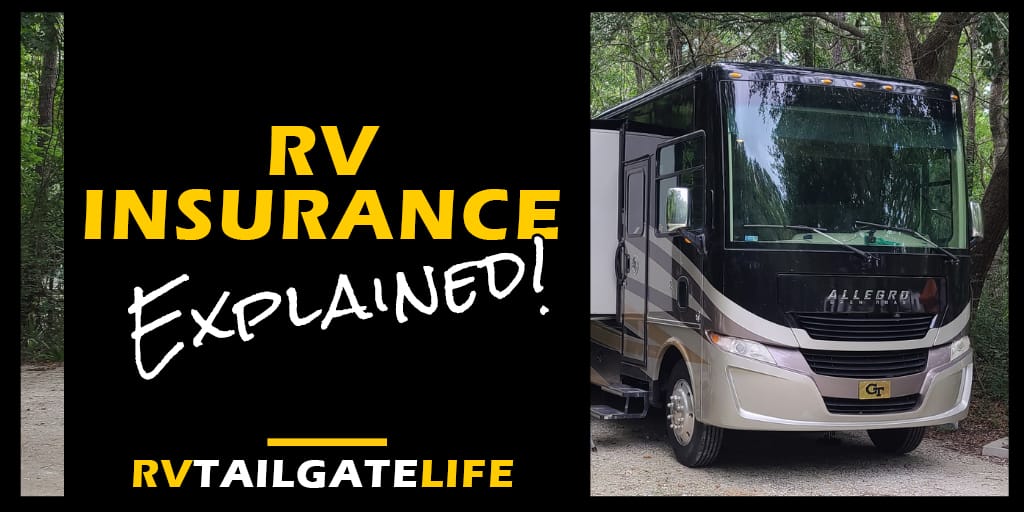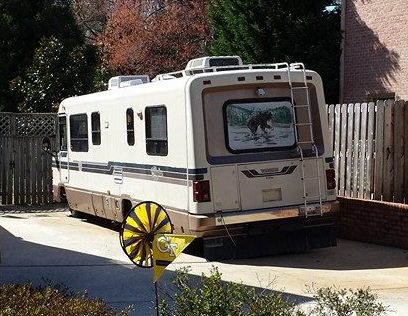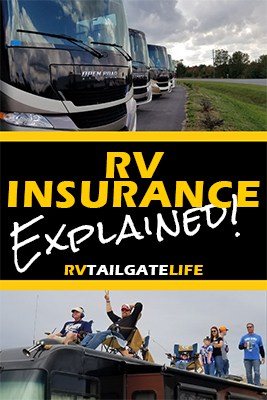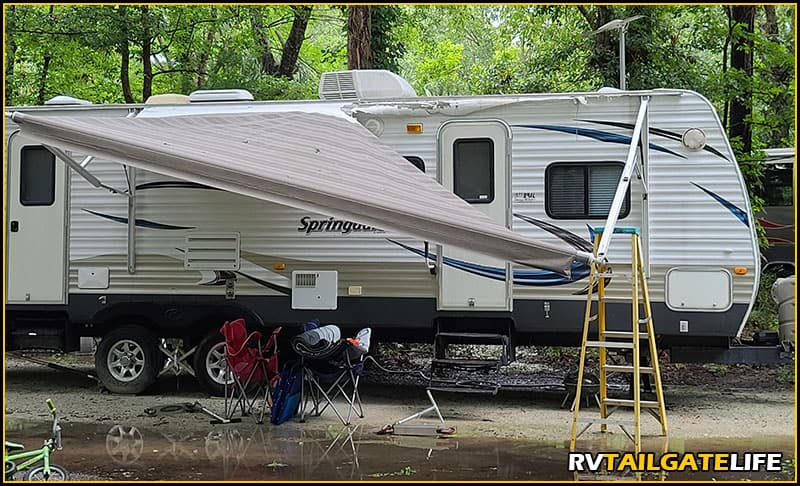RV Insurance Explained Before You Shop
You’ve got your new (or new to you!) RV and now it is time to insure your RV! But where do you start? Let’s go through this guide to RV Insurance and get it all explained for you!
I have often described my Class A motorhome as part-home, part-vehicle. And who doesn’t love sending your home through an earthquake every couple of days as you move from tailgate to tailgate?
But today, let’s talk about the boring part of RVing, making sure your RV is properly insured. And how you can shop for insurance with specialized RV Insurance agents!

Disclosure: The information provided herein is for informational purposes only. Please consult with an insurance agent or other appropriate advisor before relying on this information, as it is subject to change at any time.
RV Insurance Explained
Back when I had Starter RV, I didn’t care so much about the insurance. I mean, I bought the RV for $4,000 in cash from a friend of mine. It was already 24 years old and barely hanging on! But it was my chance to try out the whole RV life on the cheap.
So I just got the basic vehicle coverage – state mandated minimums for a vehicle to travel on its roads. I wasn’t concerned about the RV itself – if it burned down or got stuck on the side of road, just haul it off and I’d be fine, no harm, no foul.
But then I upgraded to my Class A gas motorhome made by Tiffin. This was a little more expensive than Starter RV. It definitely was not $4,000… I paid more than that for the downpayment and took out a hefty loan afterwards!
Now, it was time to really start looking at insurance options. Because if something happened to this baby, I didn’t want to be left paying off a loan when I didn’t even have the fun part of the RV!
And in the meantime, I definitely don’t want to have my license revoked or for the state to come after me with fines or potential jail time for not having the right RV insurance! That’s where the professionals at Charlotte Insurance come into play!
Let’s Talk RV Insurance Basics
What is it that you are looking for in an RV insurance policy?
Typically, you want to cover the auto part as well as the home part of your RV.
State Minimum Insurance
First, you want to meet all your state minimum insurance requirements if you have a motorized RV – so your Class A, Class C, sprinter vans, etc. That’s just the basic liability insurance that you’ll need. That’s the insurance the protects the other people out there from your bad driving (or at least from accidents that you may cause).
Nerd Wallet has a good summary of state minimum coverages for all states.
Once you get into RVing, it’s likely that you’ll have additional assets that you want to protect. It’s probably advisable that you get more than the state minimum coverage for the liability insurance. After all, people will see that motorhome and think “Payday!” if you are in a wreck with them.
This is also why I highly recommend that you have an RV Dash Cam when you are on the road. Nothing like a little “brake check!” for someone to try to collect a payday from you. At least this way, you’ll have the video evidence to show that it isn’t your fault in such an accident!
Comprehensive and Collision Insurance
Second, there’s the physical damage insurance component – think comprehensive and collision. You are likely not required by state law to have this kind of insurance. But if you are like me and have a loan on your RV, your lender likely requires this.
Comprehensive insurance usually covers things like theft, vandalism, and fire. So that’s pretty important in RV life!
Collision insurance usually covers you in case of an accident. Remember, the liability insurance protects other people. Collision protects you! This is what pays out for repairs to your own vehicle.
Uninsured Motorist Coverage
Third, there’s uninsured and underinsured motorist insurance – this is what protects you in case the guy that hits you has no insurance or not enough insurance. Yes, the other driver would be in violation of the law by not having their basic liability insurance, but they also are unlikely to have the funds to pay you directly for any damage.
The underinsured coverage is even more important when you have an expensive RV – as the other driver may not be insured “enough” to fix your pricey RV. You’ll want enough coverage here to make sure that you can fix your RV even if the other guy’s insurance doesn’t pay out.
Medical Payments and Personal Injury Coverage
When it comes to vehicles, it’s not just the property damage that can happen in an accident. Another big risk is the personal injuries that can happen – whether to you or your passengers or the folks in the other vehicle(s).
That’s why some states require personal injury protection or medical payments coverage. This helps cover medical bills that are a result of the accident.
What About My Homeowner’s Coverage?

If you are a part-time RVer, you may be thinking that your homeowners or renters insurance is going to cover you for any losses to your personal belongings.
That’s likely NOT the case. If you have any coverage for the contents of the RV from your homeowner’s insurance policy, it’s likely going to be quite limited.
You’ll likely not be fully insured on the contents of your RV. It’s best to look into specialized coverage for the contents of the RV!
Moreover, your homeowners insurance is not likely to cover your RV itself, no matter if it is a motorhome or a towed RV.
Again, you’ll want a specialized RV insurance policy to make sure that everything is fulled covered!
See Also: Plugging Your RV into Your Home Electric System
What about Travel Trailers and Fifth Wheels?
For those that are towing a travel trailer or fifth wheel, you won’t need the vehicle coverage on the RV like you would for a motorized Class A or Class C. That’s because generally, the liability coverage of the towing vehicle is going to kick in to cover you in case of an accident on the road.
But that means that you need those coverages on your vehicles themselves! I mean, that truck of yours needs insuring too! Oftentimes, if you bundle your vehicle with your RV, you can get discounts. So it is definitely worth shopping with an insurance agent that knows what they are doing when it comes to RV insurance!
Also, if you are borrowing money to buy your RV, your lender might require that you have insurance to cover physical damage. Definitely check your loan paperwork for your requirements!
Even if you paid cash or your lender doesn’t require it, you will want to explore the comprehensive, collision, and personal belongings coverages to protect your investment.
The good news is that since you don’t need those liability coverages, your insurance is going to be cheaper than it would be for a comparable motorhome!
Special RV Insurance Coverages
So on top of the vehicle and contents coverage we’ve already talked about, did you know that there are MORE coverages available specifically for RVs?
- Towing and emergency roadside assistance is available with a lot of RV insurance plans! And in my experience, it is a lot more affordable to add-on to your insurance plan than to get a separate membership to a roadside emergency club that covers RVs! This can also include locksmiths for when you inevitably lock yourself in or out of your RV, battery jump start service, fuel delivery services, and winching services to get you out of sticky situations.
- Vacation Liability is similar to what you get for injuries around your house – this coverage is for while you are parked and tailgating and protects you from people making claims for tripping over the electrical cord or falling into the firepit.
- Emergency Expenses Coverages can be great for helping to cover hotel and transportation expenses while your RV is being fixed after an accident!
- Pest coverage How would you like to have coverage against pests in your RV? I mean, we all have various problems with them at some point. And mice can be really bad when they chew up the wires in your engine. Some RV insurers have pest protection!
- RV Roof Coverage Some insurance companies also offer up RV roof protection! So when that tree branch comes crashing down, you’ll be protected. And the coverages may even insure other parts of your RV that are caused by roof damage – so the water damage inside that is caused by the busted ceiling light could be covered! Hot damn! Some companies even cover normal wear and tear damage which is unusual in the insurance industry.
- Windshield and Glass Coverage can be really important for those large Class A windshields!
- Pet Coverage would cover vet bills if your dog or cat is injured in an accident or while riding in your RV
Note: not all additional coverages are available with all insurance companies. It’s definitely wise to shop around to see what is available and at what price.
Total Loss Replacement
The other big coverage to note is Total Loss Replacement.
In some cases, this means that if you have a total loss on your RV (it’s totaled in an accident on the highway or it’s burned or flooded), you’ll get a brand new RV of the same model year or later. With the same features or better.
And if you decide that after that you are done with RVing or you don’t want to buy one right now, you can get the original purchase price from the insurance company.
Yes, this is one of the more expensive coverages but with everything going on out there, it may be well worth it if something goes wrong!
What Does RV Insurance NOT Cover?
So RV insurance is not some magical thing that will protect you from all things horrible that could potentially happen to you or your RV.
For example, RV insurance is not going to protect you from wear and tear or improperly maintaining your RV.
Most policies are also going to exclude damage from mold, fungi, or rot. In many cases these are the consequences of not maintaining your RV or not repairing damage quickly.
Some policies are also going to exclude damage from flooding and earthquakes.
Definitely make sure that you know what’s covered, especially if you are in or around flood plains!
Traditional Insurance Agents
In my experience, most insurance agents are horrible at getting RV insurance coverage right.
I have a great insurance agent near home. She takes care of my sticks and brick home as well as various other policies that I have.
But when it came to RV insurance, she was hopelessly lost. And that’s pretty common.
See, most agents don’t have experience with RVs. And when they do, they aren’t going to be pricey Class A motorhomes.
A Class A Big Rig with a large price tag is a specialty product. Not everyone has the experience necessary to be able to find you the best prices and the best coverage!
My First Big Rig RV Quote
Back in 2017, when I bought my RV, I asked that agent to get me a quote.
The quotes were a mess. While the quote was reasonable in price, when I dug into the policy, it didn’t have the right coverage.
Remember, this thing is part house and part vehicle. So is $5,000 coverage on your contents going to be sufficient?
I’ve got 4 good size televisions, leather couches, king size bed, a residential fridge (have you seen the price tag on those lately!?!?!), and a stackable washer and dryer.
And my personal stuff – clothes, personal mementos, dishes and pots and pans, and ALL THE TAILGATING GEAR!
Yeah, $5,000 just isn’t going to cover all the contents on a brand new Class A motorhome!
I can also say that I didn’t like the cost that they had in their muddled together proposal – picking and pulling from various different types of policies to cobble together an RV policy. It just didn’t work for me. That’s why I went with a specific RV insurance policy!
How Charlotte Insurance is Different
The team at Charlotte Insurance is different from most agents.
See, they have a TON of experience in writing RV insurance policies. Like years and years worth of it.
And they are a broker – so they are not beholden to any individual RV company. They can shop around against a whole slew of insurance companies to find the best deal for your motorhome or travel trailer! They can tailor the coverages and prices to your RV and your financial condition…
Can’t afford a lot of coverage? Then they can work to tailor the coverage to fit your price tag!
Charlotte Insurance agents are licensed in over half the states in the United States and are adding more states all the time! Even if they aren’t licensed in your state, they can review your existing policies and make suggestions on where you should improve your coverages!
These guys are experts in RV insurance and can get you the best deal for the coverages you need and want at a good price!
And if for some reason you’ve got coverage that they cannot meet on price, the agents are honorable and will tell you that you’ve got a better deal where you are. They aren’t just trying to get the commissions, Charlotte Insurance really wants to find the best insurance coverage for you!
Aren’t Insurance Brokers Expensive?
No! In fact, they don’t cost you a thing. They are paid commissions by the insurance companies that issue you your policy. That means that you don’t have to pay anything directly.
But more importantly, they know insurance – they can cut through all the various coverages and figure out exactly what works best for you! They can clarify what is and what is not covered by the policy, the deductibles, common situations that you may face and why each coverage is important to your RV lifestyle!
Even if you had to pay a small fee, their job of cutting through all the BS and finding the right policy for YOU would make it completely worthwhile. Because who has time to look at 35 different insurance companies and all their offerings to find something that works best for you??? I know I don’t have time for that!
Do You Tow a Car?
When Marty at Charlotte Insurance was shopping my RV and auto insurance, I learned something new.
It was kind of obvious after I thought about it, but I never explicitly knew this before.
So when you have a travel trailer, the liability coverage for your trailer flows through the truck towing it. Which means if you own a travel trailer, you don’t need liability coverage for your RV.
But what about for the motorized guys? People with Class As and Class Cs often tow a car… I’m one of those people.
One of the reasons that insurance companies often require motorized RVers to include the car is because the same rule applies when you are towing. The towed car is covered by the motorhome’s liability insurance while underway.
You’ll still need liability insurance for when you are driving the car, but you’ll also want to make sure your motorhome’s liability coverage is sufficient to cover both your motorhome and your vehicle.
Tow Dolly and Trailer Coverage
Some RV insurance policies also include coverage for the tow dolly or enclosed trailer for your car, motorcycle, or other toys.
If you are in an accident and the tow dolly is damaged, your motorhome’s insurance will cover it.
But only if you have this coverage on your insurance policy! A great reason to work with an independent broker agent like Charlotte Insurance!
RV Insurance When You Are Full-Time
One of the big factors of the price of your RV insurance is going to be how often you use the RV. In fact, this may be the biggest factor after the specific coverages you choose.
When you are a full-time RVer, it may be really tempting to tell the insurance company that you are less than full-time so you can save on your RV insurance.
But therein lies the problem – you’ve just lied to your insurance company. And that is a big problem!
Sure, you may never get caught. But let’s say that you do get in an accident. And the insurance adjuster starts snooping around because you don’t have anywhere to live until you get a new RV! The adjuster figures out that you are full-time and you lied to them. All of a sudden, your claim is denied, and you’ve lost your coverage.
Additional Coverages for Full-Timers
But it’s not all bad news for full-timers. First, you don’t have that expensive home to maintain nor the associated homeowner’s insurance for it.
Second, with full-time RVers insurance, you can add additional coverages that are commonly found in homeowner’s insurance.
Full timer’s liability can also be had for those that are worried about people having injuries in or around your RV. (It’s the same type of coverage that recreational users get out of vacation liability)
Meanwhile, loss assessment can be used for those that are parts of RV associations – buy an RV lot in a neighborhood and then it is damaged by a storm. The loss assessment coverage is useful for those common assessments found in a neighborhood homeowners association.
Another coverage available for full-time RVers would be secured coverage – this is for full-timers that weren’t quite able to sell off all their sticks and bricks furniture and mementos but don’t keep them in the RV. This coverage protects your items in a secured storage area so you don’t need a separate insurance policy.
Scheduling Jewelry and Other Valuables
It’s pretty well known in homeowners insurance that certain valuables are only minimally covered. Things like jewelry, art work, collectibles are usually limited under the personal effects coverage to $500 or $1,000 per piece.
And that’s not a lot for that engagement or wedding ring!
Once you go full-time and no longer have homeowners insurance, you’ll want to make sure that you have anything valuable like jewelry separately covered. You can have a jewelry policy or you can often schedule them separately in your motorhomes insurance policy.
Saving Money by Shopping Your RV Insurance

Times are difficult right now, coming out of two plus years of chaos and now all the turmoil in the economy and the world. It sure would be nice to save some money on your RV insurance.
That’s why I recommend that you shop with the professionals at Charlotte Insurance who can help tailor an RV Insurance policy for you, your RV, and your financial picture! Protect your family from undue hardship should anything bad happen in or around your RV!
Like this RV Insurance Guide? Pin for later!
You May Also Like:
7 Common RV Mistakes to Avoid
TPMS: Protect RV Tires with Tire Pressure Monitoring Systems
Preparing for Hurricanes in an RV


I like that you pointed out how you want to meet all of your state minimum insurance requirements if you have a motorized RV. I like RVs, so I am thinking of finally buying one soon. I heard RV insurance estimate services are being offered now, so I should probably look into that too.